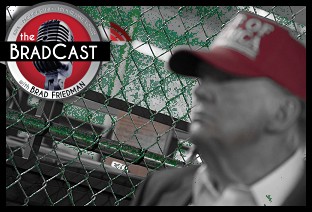 Finally. For the first time in years, the Federal Communications Commission (FCC) has rolled back the mad consolidation of our public airwaves by huge corporate interests.
Finally. For the first time in years, the Federal Communications Commission (FCC) has rolled back the mad consolidation of our public airwaves by huge corporate interests.
Today's party-line vote by commissioners is just one small step for the FCC, but it may suggest that, under its new Chair Tom Wheeler, the federal agency may once again be showing some interest in fulfilling its mission of assuring that the public airwaves actually serve the public interest...
In a tense vote, the agency closed a loophole that has allowed companies like Raycom, Sinclair and Tribune to evade federal ownership limits. The industry calls these loopholes "joint service agreements," but we call them "covert consolidation" because they allow companies to control as many as four TV stations in the same market. Companies that have exploited the JSA loophole have gutted newsrooms and often broadcast the exact same newscast on multiple stations in the same community - if they run any news at all.
...
In the wake of this decision, some companies will be forced to sell off stations that violate the new rule.
...
In addition, the JSA loophole was one of many. The Department of Justice has pushed the FCC to close all loopholes and a recent statement from the FCC's media bureau suggests it's primed to scrutinize future deals.
The LA Times reports the new rules "will greatly reduce and potentially bring to an end the popular practice of business partnerships between competing local television stations."
Mind you, many of the corporations who have been abusing the rules by partnering to avoid competing with other local stations are the very same corporations who pretend to be in favor of so-called "free market competition."
The Times goes on to note that "FCC Chairman Tom Wheeler said such partnerships have been abused by many broadcasters who have used so-called joint sales agreements to get around the regulatory agency's rules limiting the number of television stations a broadcaster can own."
"Broadcasters will have two years to unwind their joint sales agreement arrangements or can file a request for a waiver and try to make the case that the partnership serves the public interest," the paper reports. Public advocates like Free Press President and CEO Craig Aaron, who otherwise lauded today's vote, still has "concerns about how the FCC will apply waiver standards."
Still, Aaron said in a statement issued today, the new rules amount to very encouraging news from the FCC for a change...
"While today's vote focuses only on Joint Sales Agreements, it signals that FCC Chairman Tom Wheeler is willing to break with the past and stop broadcasters from using shell companies to skirt the agency's ownership limits.
"It's time for conglomerates to start playing by the rules. Divesting some of their stations could open the door for truly independent and diverse owners to enter a marketplace conglomerates have controlled for years."
"Under the new rules," according to the Times, "a broadcaster that accounts for more than 15% of another station's advertising sales would be seen by the FCC as the defacto licensee of that station. For many broadcasters, such a caveat could put them in violation of the FCC's ownership rules. The FCC typically limits the amount of stations one company can own in an individual market to one in all but the biggest cities."
Don't know that we've ever said it on this site --- especially following the FCC's most recent debacle folding under one-sided pressure from the corporate rightwing (ironically, issued over the very same public airwaves the FCC is supposed to oversee) forcing them to back off of a Congressionally mandated study that might have helped take back some of the public airwaves from the corporate rightwing which thinks they own them --- but: Good for the FCC!
It remains to be seen if actual oversight of our public airwaves, as mandated by law, continues under Wheeler's chairmanship at the agency. We may know a lot more once they finally decide on the pending question of whether Rush Limbaugh and friends present "bona fide news" over our public airwaves, as the FCC will soon be forced to determine.


 Trump IRS Agrees to Allow Churches to Endorse Political Candidates. Are All Nonprofits Next?: 'BradCast' 7/15/25
Trump IRS Agrees to Allow Churches to Endorse Political Candidates. Are All Nonprofits Next?: 'BradCast' 7/15/25 'Green News Report' 7/15/25
'Green News Report' 7/15/25
 Repub Support for Immigrants Skyrockets Amid Trump's Crackdown: 'BradCast' 7/14/25
Repub Support for Immigrants Skyrockets Amid Trump's Crackdown: 'BradCast' 7/14/25  Sunday 'Totally Predictable' Toons
Sunday 'Totally Predictable' Toons Democracy STILL Our Best Way Out of This Mess -- And Repubs Know It: 'BradCast' 7/10/25
Democracy STILL Our Best Way Out of This Mess -- And Repubs Know It: 'BradCast' 7/10/25 'Green News Report' 7/10/25
'Green News Report' 7/10/25 'Mass Shooter Subsidy'?: More Dumb, Deadly Stuff in Trump's New Law: 'BradCast' 7/9/25
'Mass Shooter Subsidy'?: More Dumb, Deadly Stuff in Trump's New Law: 'BradCast' 7/9/25  Trump's New Law Supersizes ICE, Mass Detention, Militarization: 'BradCast' 7/8/25
Trump's New Law Supersizes ICE, Mass Detention, Militarization: 'BradCast' 7/8/25  'Green News Report' 7/8/25
'Green News Report' 7/8/25 Texas Flooding Tragedy Was Both Predictable and Predicted: 'BradCast' 7/7/25
Texas Flooding Tragedy Was Both Predictable and Predicted: 'BradCast' 7/7/25 Sunday 'Big Billionaire Bonanza' Toons
Sunday 'Big Billionaire Bonanza' Toons Sunday 'Total Obliteration' Toons
Sunday 'Total Obliteration' Toons 'Green News Report' 6/26/25
'Green News Report' 6/26/25 Thank You For Your Attention to This Matter:
Thank You For Your Attention to This Matter: Mamdani Primary 'Win' Augurs New Era of Rising Progressives: 'BradCast' 6/25/25
Mamdani Primary 'Win' Augurs New Era of Rising Progressives: 'BradCast' 6/25/25 U.S. Authoritarianism Under-way (But We're Still Here to Fight It): 'BradCast' 6/24/25
U.S. Authoritarianism Under-way (But We're Still Here to Fight It): 'BradCast' 6/24/25 'Anti-War' Trump Attacks Iran on False Claims About WMD: 'BradCast' 6/23/25
'Anti-War' Trump Attacks Iran on False Claims About WMD: 'BradCast' 6/23/25 Senate Health Care Cuts 'More Extreme' Than House Version: 'BradCast' 6/19/25
Senate Health Care Cuts 'More Extreme' Than House Version: 'BradCast' 6/19/25 What 'Anti-War President'? MAGA Civil War Over Trump, Iran: 'BradCast' 6/18/25
What 'Anti-War President'? MAGA Civil War Over Trump, Iran: 'BradCast' 6/18/25 Trump's 'Remigration' is Code for 'Ethnic Cleansing': 'BradCast' 6/17/25
Trump's 'Remigration' is Code for 'Ethnic Cleansing': 'BradCast' 6/17/25 Last Weekend Today: 'BradCast' 6/16/25
Last Weekend Today: 'BradCast' 6/16/25
 VA GOP VOTER REG FRAUDSTER OFF HOOK
VA GOP VOTER REG FRAUDSTER OFF HOOK Criminal GOP Voter Registration Fraud Probe Expanding in VA
Criminal GOP Voter Registration Fraud Probe Expanding in VA DOJ PROBE SOUGHT AFTER VA ARREST
DOJ PROBE SOUGHT AFTER VA ARREST Arrest in VA: GOP Voter Reg Scandal Widens
Arrest in VA: GOP Voter Reg Scandal Widens ALL TOGETHER: ROVE, SPROUL, KOCHS, RNC
ALL TOGETHER: ROVE, SPROUL, KOCHS, RNC LATimes: RNC's 'Fired' Sproul Working for Repubs in 'as Many as 30 States'
LATimes: RNC's 'Fired' Sproul Working for Repubs in 'as Many as 30 States' 'Fired' Sproul Group 'Cloned', Still Working for Republicans in At Least 10 States
'Fired' Sproul Group 'Cloned', Still Working for Republicans in At Least 10 States FINALLY: FOX ON GOP REG FRAUD SCANDAL
FINALLY: FOX ON GOP REG FRAUD SCANDAL COLORADO FOLLOWS FLORIDA WITH GOP CRIMINAL INVESTIGATION
COLORADO FOLLOWS FLORIDA WITH GOP CRIMINAL INVESTIGATION CRIMINAL PROBE LAUNCHED INTO GOP VOTER REGISTRATION FRAUD SCANDAL IN FL
CRIMINAL PROBE LAUNCHED INTO GOP VOTER REGISTRATION FRAUD SCANDAL IN FL Brad Breaks PA Photo ID & GOP Registration Fraud Scandal News on Hartmann TV
Brad Breaks PA Photo ID & GOP Registration Fraud Scandal News on Hartmann TV  CAUGHT ON TAPE: COORDINATED NATIONWIDE GOP VOTER REG SCAM
CAUGHT ON TAPE: COORDINATED NATIONWIDE GOP VOTER REG SCAM CRIMINAL ELECTION FRAUD COMPLAINT FILED AGAINST GOP 'FRAUD' FIRM
CRIMINAL ELECTION FRAUD COMPLAINT FILED AGAINST GOP 'FRAUD' FIRM RICK SCOTT GETS ROLLED IN GOP REGISTRATION FRAUD SCANDAL
RICK SCOTT GETS ROLLED IN GOP REGISTRATION FRAUD SCANDAL VIDEO: Brad Breaks GOP Reg Fraud Scandal on Hartmann TV
VIDEO: Brad Breaks GOP Reg Fraud Scandal on Hartmann TV RNC FIRES NATIONAL VOTER REGISTRATION FIRM FOR FRAUD
RNC FIRES NATIONAL VOTER REGISTRATION FIRM FOR FRAUD EXCLUSIVE: Intvw w/ FL Official Who First Discovered GOP Reg Fraud
EXCLUSIVE: Intvw w/ FL Official Who First Discovered GOP Reg Fraud GOP REGISTRATION FRAUD FOUND IN FL
GOP REGISTRATION FRAUD FOUND IN FL

































